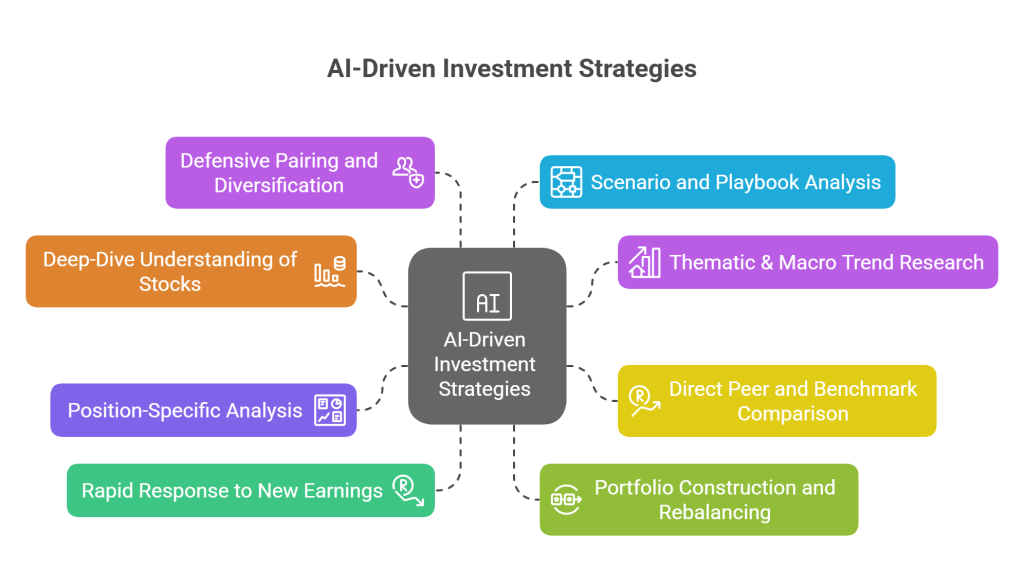f you’re fortunate enough to have some investable money, ChatGPT can significantly boost your ability to find and evaluate great stock opportunities. This isn’t investment advice; it’s a practical demonstration of how you can leverage ChatGPT to enhance your stock market performance.

My Overall Approach to Investing with AI
If nothing else, consider utilizing steps 1 and 2 below. The remaining strategies showcase how I personally use AI to support investment decisions. For this, I used ChatGPT O3 version as well as ChatGPT 4.1. Both were excellent and much better than Gemini 2.5. Claude 3.7 was also good and sound information, but I liked the extra information from the Chat GPT as it was able to be more directional.
1. Deep-Dive Stock Analysis
Prompt: “Conduct a comprehensive analysis of [Company X] to determine its investment viability. Include fundamental, technical, and macroeconomic factors. Evaluate revenue streams, financial performance, valuation, industry landscape, risks, growth opportunities, and provide a final investment recommendation.”
Purpose: Generates a thorough, 360-degree report on a stock, highlighting strengths, weaknesses, opportunities, and threats—a robust equity research summary.
2. Thematic & Macro Trend Research
Prompt: “What US-based investment trends are worth exploring based on recent news?”
Purpose: Leverages ChatGPT’s news-awareness to uncover macro trends (e.g., AI infrastructure, pharmaceuticals, defense spending) and identify ticker symbols you might overlook using traditional screeners.
3. Direct Peer and Benchmark Comparison
Prompt: “For the past year, compare [Stock] to [ETF, e.g., SCHB] and [High-performing Stock, e.g., NVDA]—if selling, my funds would be reallocated here.”
Purpose: Determines opportunity cost by assessing not just a stock’s individual merits, but its comparative value relative to potential alternatives.
4. Personalized Position Analysis
Prompt: “Here’s my current holding—still a good hold? Check the latest quarterly earnings before responding.”
Purpose: Delivers tailored advice based on your actual cost basis, gain/loss, and the latest earnings, providing highly relevant, actionable insights.
5. Rapid Earnings Response
Prompt: “Earnings were just announced, and the price has hit my target buy zone—what’s the recommended action? Did the earnings report alter the outlook?”
Purpose: Quickly guides tactical decisions by blending technical indicators with fresh fundamental analysis.
6. Portfolio Rebalancing Guidance
Prompt: “I sold $XX of [ETF] in my Roth IRA and bought $YY of [Stock] at $ZZ. How should I allocate the remaining funds? How does this impact my risk and asset allocation?”
Purpose: Provides instant feedback on how recent transactions impact your portfolio balance, liquidity, and risk profile, suggesting logical next steps.
7. Defensive Pairing and Diversification
Prompt: “Do any of my other target stocks (e.g., PFE, BMY, MRK) serve as good short-term complements to my recent purchase?”
Purpose: Identifies stocks with complementary risk/reward profiles, balancing aggressive holdings with defensive assets to enhance portfolio stability.
8. Scenario and Playbook Analysis
Prompt: “Clarify this tactical idea: ‘Starter tranche <$115, add layers at $100 support.’ Provide examples, set up real-life alerts, and outline actionable steps.”
Purpose: Translates investment jargon into actionable strategies, detailing exact steps, order types, and practical execution tips.
Adapting These Prompts to Your Investing Strategy
- Request actionable advice, not just theoretical knowledge. Always aim for clear, actionable next steps.
- Include current news. Enhance prompts with “consider the latest earnings” or “based on this week’s developments” for timely, relevant responses.
- Balance strategic and tactical prompts. Employ broad comparative analyses for large-scale allocation decisions and specific prompts for immediate trade decisions.

